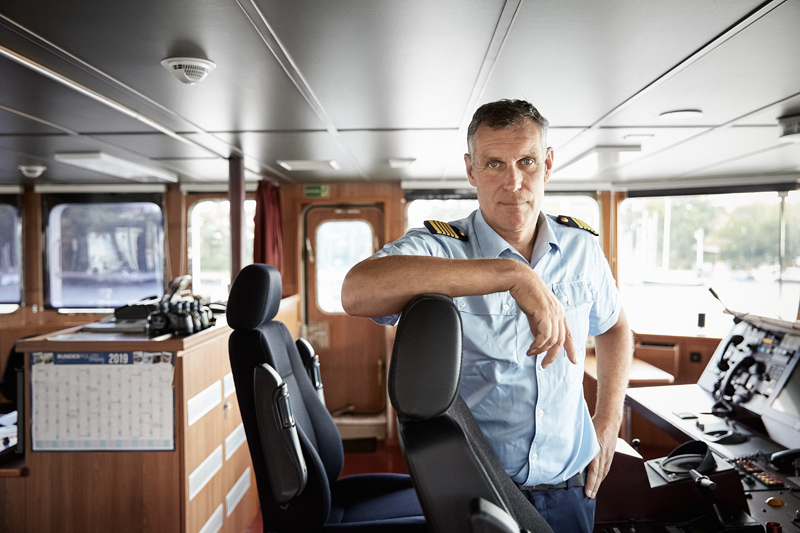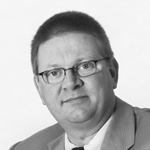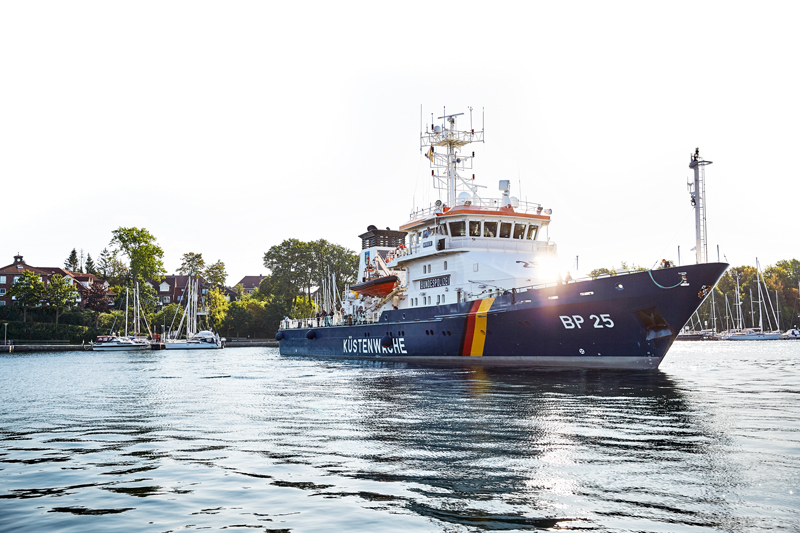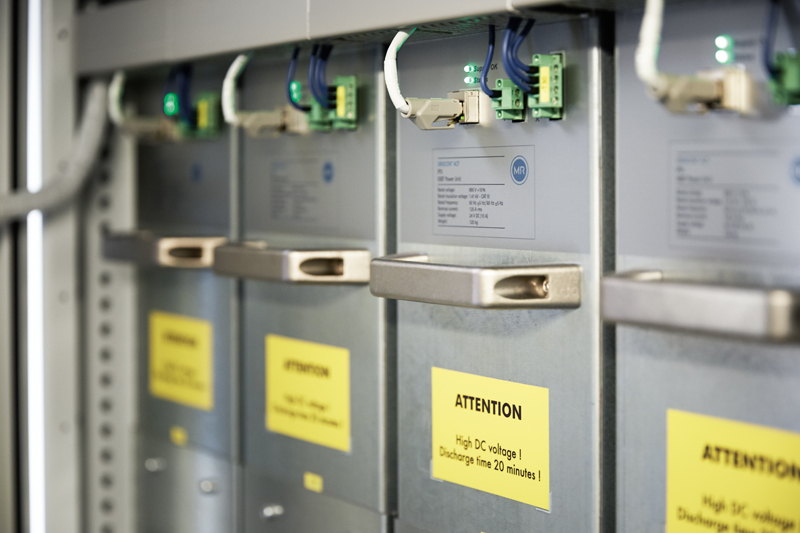On board the ships of the German federal police force, problems with harmonics regularly interfered with the electronic equipment. But since active filters from the GRIDCON® ACF series were installed on board, their power supply has been free from interference.
The Bayreuth glides almost silently into the harbor at Neustadt in Holstein on a bright and sunny morning. The silence is only broken by the Baltic Sea gently lapping against the side of the police ship that measures almost 66 meters in length and ten meters in width. Almost the full crew is standing at the ship’s rail in their blue uniforms. The officers look to their colleagues waiting patiently on the quay for their shift on board.
They have been at sea for six days, patrolling the 140-nautical-mile coastal stretch between the Flensburg Firth and Bukspitze cape in the Bay of Mecklenburg. Following a 360-degree turn, the Bayreuth slowly approaches the quay wall. The lines are sent flying through the air and the ship is securely moored up by 10 a.m. Right on time. Now it’s time for the crews to change over and provisions to be restocked for the next few days at sea.
Commanding Officer Frank Rogatty can usually be found standing up on his bridge. He has been traveling to sea for the German federal police force since 2002. He says: “We are one of three coastguard ships that cover the North and Baltic Seas.” It is their job to perform checks on ships crossing over international sea borders, emergency rescue operations at sea, harbor inspections, and standard traffic checks, just like the ones performed by officers on land. After all, there are speed limits and priority rules at sea too.

Summer is the busiest time of year, as commercial ships have to share the water with motorboats, yachts, and stand-up paddle boards. The crew is made up of 14 police officers, who work in three shifts to ensure that the coastguard patrol is always in action. Sometimes the crew is even bigger.
“We have to be outside no matter what the weather is like and we need to be able to rely fully on the technology we have on board—especially when we need to maneuver quickly when visibility is poor and the sea is rough,” says Rogatty, pointing at the on-board equipment. “This is a complex system. All the electrical components have to work perfectly in sync.”
Problems with harmonics
This is exactly the problem that they were encountering two years ago. The crew’s cell phone chargers kept breaking, the dishwasher and individual computers were regularly out of action, and key functions performed by the electronic equipment in the bridge were being disrupted.
It took quite some time until the cause of these issues was identified. The culprit was actually a few floors beneath the crew in the ship’s belly. It was the frequency converter of the ship’s electric engine. Head Machine Operator Volker Uhlenbrock shouts above the noise coming from the engine room: “We kept noticing interference once we had hit a certain speed. This led us to the idea that harmonics could be interfering with the other electrical components. We always have around 50 electrical installations on board.”
The other German police force ships were experiencing the same phenomenon. While each of the ships still has a diesel engine, this is only really intended for use in emergencies or when really high speeds are needed. For standard operation, the electric engine is used since it consumes less fuel, produces fewer emissions, is quiet, and doesn’t disrupt the crew’s sleep. And the maintenance costs are lower when the diesel engine is used less often. “Two diesel generators supply the power required for the drive and on-board electrical equipment, with a continuous output of 450 kilowatts each,” says Uhlenbrock.
“We can now focus all of our attention on our police work without having to worry about the on-board electrical equipment.”Frank Rogatty, Commanding Officer of the Bayreuth
As the issues with the power supply on board showed no signs of stopping, the German police force decided to look for a solution. And Reinhausen had just what they were looking for. Thomas Zöllner, who works at Power Quality, is an expert in ship technology so he was able to help: “The problem with isolated grids is that they have a much lower short-circuit capacity compared to grids on shore.
This means that the technology is more likely to suffer from interference on the whole.” The German police force is by no means alone in experiencing these problems. Shipyards are relying more and more on electric engines, while the use of electronic equipment installed on board is also on the rise. This is also true for super yachts and special-purpose ships such as cable layers and suction dredgers.
Fighting Harmonics
Zöllner explains: “Unpleasant network perturbations caused by harmonics is a familiar phenomenon within the automotive sector where disruption to the factory power supply can cripple the entire production process.” To avoid this, grid operators have been using active filters for some time now. “That’s how we can eliminate problematic harmonics. The active filters in our GRIDCON® series automatically detect limit-value deviations and emit opposing waves to balance out any such fluctuations. This same principle can also be applied to ships,” says Zöllner.
In order to prove that harmonics were in fact to blame for the problems and to tailor the active filters to the requirements on board the ship, the Power Quality expert took a lot of readings and measurements over several days. “We basically performed an ECG on the on-board electrical system,” explains Zöllner. The results were astonishing! While the standard allows a proportion of harmonics up to eight percent (with five percent as the recommended value), up to 14 percent was measured on the ship
Zöllner determined that the industrial GRIDCON® ACF would be the ideal filter solution here. But it wasn’t possible for the active filter to be installed in the same way as it is on dry land: “The swaying and vibrations on the ship could damage the technology. And so we had to install vibration absorbers underneath the control cabinet,” says Zöllner. Once the necessary tests had been passed, all three of the German police force’s ships were fitted with the Reinhausen filter solution.
Full Steam Ahead
The GRIDCON® ACF has been in use on the Bayreuth for two years now. Head Machine Operator Uhlenbrock is delighted with the results: “All the problems we were having have disappeared. And I don’t have to do a thing because the filter is fully automatic. The system simply goes into standby whenever we turn the engine off.”
Commanding Officer Rogatty is just as happy: “We can now focus all of our attention on our police work without having to worry about the on-board electrical equipment.” Both of these experienced seafarers have now ended their shifts and handed everything over to the next crew. The Bayreuth is ready to set off again by 2 p.m. It departs slowly and heads back out onto the Baltic Sea as quietly as it arrived.
REINHAUSEN INSIDE
The GRIDCON® ACF active filter solution is ideal for a wide range of applications. In addition to the automotive sector and on board ships, active filters can be found on wind farms, in mines, in sewage treatment plants, within the food industry, and in office and commercial buildings. Active filters automatically compensate for harmonics and they can be relied upon to do so with great accuracy.The modular design means that the solution can be adapted to suit each customer’s specific requirements.
YOUR CONTACT

Want to find out more about using active filters on ships?
Thomas Zöllner is here to help:
T.Zoellner@reinhausen.com



